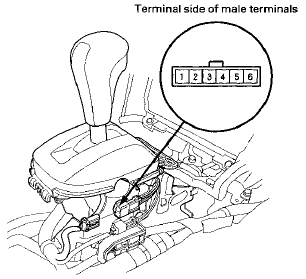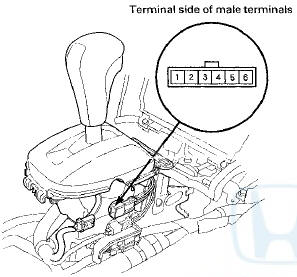 Honda Accord: Park Pin Switch Test
Honda Accord: Park Pin Switch Test
Produced in USA models
1. Remove the center console (see page 20-158).
2. Disconnect the A/T gear position indicator panel light/park pin switch 6P connector (A) from the park pin switch (B).

3. Check for continuity between connector terminals No.
1 and No. 2.
There should be continuity.
• There should be continuity when the shift lever is moved out of P.
• There should be continuity when the shift lever is moved to P.
4. If continuity is not as specified, replace the park pin switch (see page 14-258).
Produced In Saitama models .
1. Remove the center console (see page 20-158).
2. Disconnect the A/T gear position indicator panel light/park pin switch 6P connector (A) from the park pin switch (B).

3. Check for continuity between connector terminals No.
1 and No. 2.
• There should be continuity when the shift lever is moved to P.
• There should be continuity when the shift lever is moved out of P.
4. In continuity is not as specified, replace the park pin switch (see page 14-258).
 Key Interlock Solenoid Test
Key Interlock Solenoid Test
NOTE: SRS components are located in this area. Review
the SRS component locations for 4-door (see page
24-21),for 2-door (see page 24-23), and the precautions
and procedures (see page 24-25) before ...
 Ignition Switch Test
Ignition Switch Test
NOTE: SRS components are located in the area. Review
the SRS component locations 4-door (see page 24-21),
2-door (see page 24-23), and precautions and
procedures (see page 24-25) before doing repai ...
See also:
Front Seat Belt Replacement
Front Seat Belt - 2-door
SRS components are located in this area. Review the
SRS component locations (see page 24-23) and the
precautions and procedures (see page 24-25) before
doing repairs or se ...
Audio-HVAC Subdisplay Unit
Removal/Installation
With Navigation
NOTE:
• Put on gloves to protect your hands.
• Take care not to scratch the dashboard.
1. Remove the dashboard center vent (see page 20-178).
2. Remove the screws, ...
ACC (Adaptive Cruise Control)*
Maintains a constant vehicle speed and a safe distance between your vehicle
and the
vehicle ahead of you without having to keep your foot on the brake pedal or
accelerator.
WARNING
Improper ...
